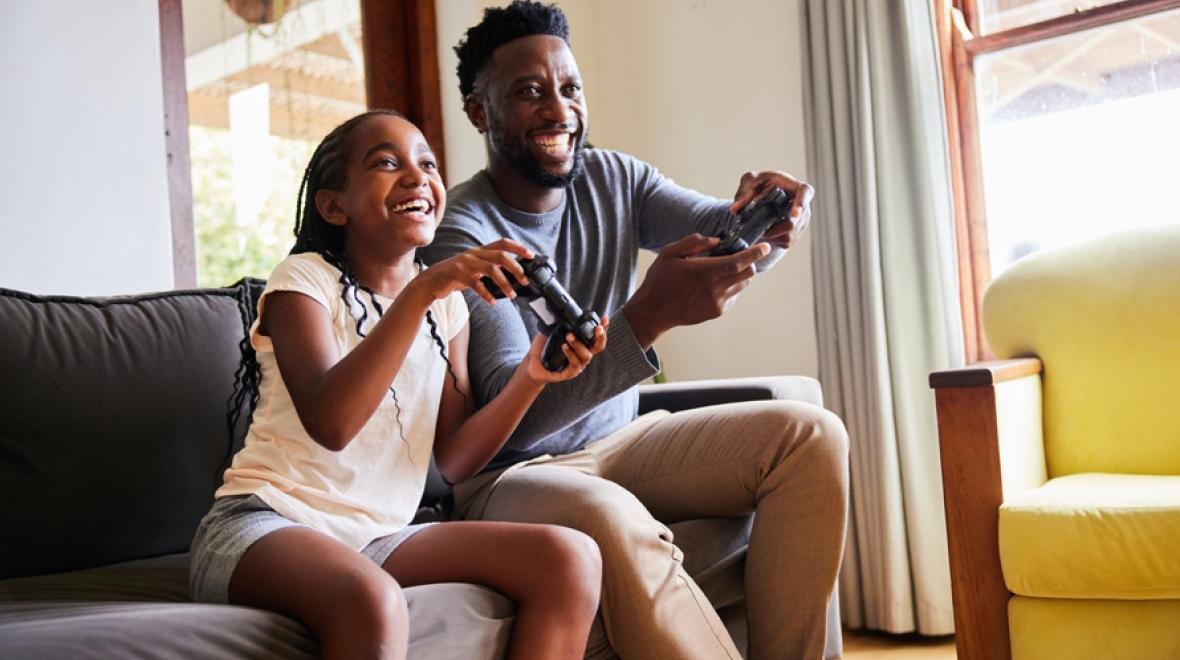
Let’s face it: video games, screen time and the internet are all here to stay. Navigating the digital world has become an important part of parenting. But for many parents, it is uncharted territory; something previous generations did not have to contend with in nearly the same way. And this new landscape comes with plenty of questions: Should I let my kid play video games? How often? When do I know it’s becoming a problem? How do I get them to stop playing without a huge fight or meltdown?
Luckily for us parents, we don’t have to navigate this landscape alone. Harvard-trained psychiatrist and former gaming addict Dr. Alok Kanojia (known as “Dr. K”) has written a new book that can serve as a guide to help parents define, set and reinforce healthy boundaries around video games. His book, “How to Raise a Healthy Gamer,” is available March 12, 2024.
As a parent of two teenage sons, I found this book not only practical and helpful, but encouraging and supportive. Dr. K believes that there are no one-size-fits-all answers to gaming. Instead, it’s about your personal relationship with your child, understanding what they are getting out of gaming and working together to find a solution that works for the whole family. He does not simply villainize video games, but sees that kids can, and do, get a lot of positive support and connection from them (something that is certainly true for my own two children).
I had the opportunity ask Dr. K some questions about his book and how he thinks parents should handle gaming.
Your book talks about “restraint not restriction” when it comes to kids and gaming. Tell me more about what you mean by that.
Imagine video games as a powerful tool. With restraint, you guide your child to use it effectively, setting healthy boundaries to ensure it complements real-life activities and responsibilities. Restriction, however, simply shuts down access, often ignoring the underlying needs fueling the gaming and potentially creating more conflict. Parenting them to understand and manage their own behavior is more sustainable in the long run.
At what point do you think parents should be concerned about the amount of time their child spends playing video games?
There’s no one-size-fits-all answer. It depends on individual factors like age, development, other activities and the impact on their well-being. Instead of focusing solely on duration, observe the impact. Are they neglecting responsibilities, isolating themselves or experiencing emotional issues due to gaming? Parents should be concerned about their child’s gaming when it begins to negatively impact other areas of their life.
Why is it important for parents to understand why their kids are playing video games?
Understanding their motivation is crucial. Do they find social connection, escape from stress or a sense of achievement? This insight helps you address the underlying needs in healthier ways, potentially with other activities or addressing deeper issues. This includes understanding the psychological and emotional needs that gaming fulfills for your child.
Do you think there are any positive aspects of gaming?
Absolutely! Games offer not only cognitive benefits like problem-solving skills and creativity but can allow kids to meet their psychological needs for challenge and achievement. Games can provide a safe judgment-free space, help kids develop a sense of identity and offer a community to connect with others. In the game, kids are challenged, accomplished, confident or proud of themselves.
Your book talks about taking weeks, even months, to develop a plan for gaming with kids. Why should parents take so long? Isn’t it better to stop the bad habit now?
Sudden change rarely works. Abruptly stopping can create a power struggle between parents and children. It also fails to address the underlying reasons for excessive gaming. Taking time allows for honest conversations, understanding their perspective, and building a mutually agreed-upon plan. Think of it as building a bridge, not burning one. Even when you think back on your own attempts at creating a habit. Deep change often happens step-by-step over time, so set realistic expectations for both yourself and your child.
Why should parents of younger children read this book, and what do you hope they will get from it?
Even young children can develop unhealthy gaming habits. The book equips parents with communication skills, understanding child development and building healthy family dynamics to help set them up for success as their child grows older.
Setting healthy boundaries and habits around gaming early on can prevent excessive gaming in the future. This goes beyond personal anecdotes or opinions. It’s built on the real-life experiences of thousands of Healthy Gamer clients, individuals and families who have transformed their lives by implementing these principles. This book is about a better life for their kid, not more control for the parent or a better outcome for a clinician.
What’s the biggest mistake you see parents make when it comes to helping a child make changes to their gaming habits?
The biggest problem is a parent versus child dynamic with shaming, punishment or demonizing games. This creates distance and resentment, making it even harder to reach your child.
Instead, we want parents to build an alliance with their child and get on the same team. Focus on understanding their motivations, collaborating on solutions and offering alternatives that fulfill their needs in healthier ways. Remember, you’re on the same team, working toward a happy and balanced life for your child.
What is the one thing you hope parents take away after reading your book?
A lot of the things that we do as parents has the opposite effect from what we intend. As an example, constantly reminding our kids to do something makes them more dependent, and less responsible.
We’re always taking the responsibility for their performance. This also applies to boundary setting — when we set an arbitrary boundary (“No games for a month!”) in a moment of anger or frustration, and then can't enforce it, we teach our kids that they can ignore what we tell them.
We all want our children to live a happy, positive and well-rounded life. “How to Raise a Healthy Gamer” can help you improve communication, set boundaries and connect with your child. In our increasingly digital world, this book is a must-read for parents.











